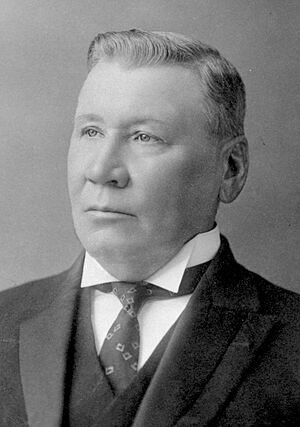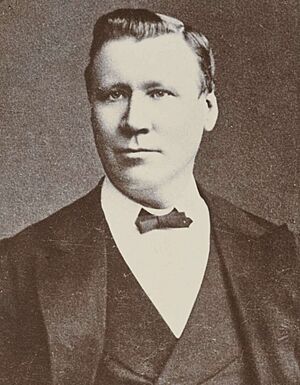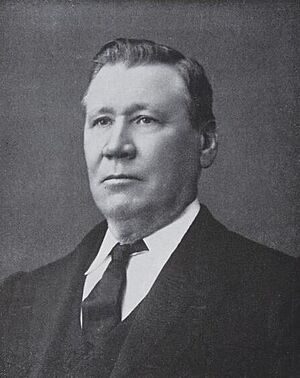John Downer facts for kids
Quick facts for kids
Sir John Downer
|
|
|---|---|
 |
|
| 16th Premier of South Australia | |
| In office 16 June 1885 – 11 June 1887 |
|
| Monarch | Victoria |
| Governor | Sir William Robinson |
| Preceded by | John Colton |
| Succeeded by | Thomas Playford II |
| In office 15 October 1892 – 16 June 1893 |
|
| Monarch | Victoria |
| Governor | Earl of Kintore |
| Preceded by | Frederick Holder |
| Succeeded by | Charles Kingston |
| 3rd Leader of the Opposition (SA) | |
| In office 1885–1885 |
|
| Preceded by | John Cox Bray |
| Succeeded by | Jenkin Coles |
| In office 1887–1889 |
|
| Preceded by | Thomas Playford II |
| Succeeded by | John Cockburn |
| In office 1893–1895 |
|
| Preceded by | Frederick Holder |
| Succeeded by | William Copley |
| In office 1897–1899 |
|
| Preceded by | William Copley |
| Succeeded by | Vaiben Louis Solomon |
| Senator for South Australia | |
| In office 30 March 1901 – 31 December 1903 |
|
| Personal details | |
| Born |
John William Downer
6 July 1843 Adelaide, South Australia |
| Died | 2 August 1915 (aged 72) North Adelaide, South Australia |
| Political party | National Defence League Protectionist (1901–03) Liberal Union (1910–15) |
| Spouses |
Elizabeth Henderson
(m. 1871–1896)Una Russell
(m. 1899) |
| Relations | George Downer (brother) Henry Downer (brother) Alick Downer (son) Alexander Downer (grandson) |
Sir John William Downer (born 6 July 1843 – died 2 August 1915) was an important Australian politician. He served as the leader of the government in South Australia, called the Premier, two times. His first term was from 1885 to 1887, and his second was from 1892 to 1893. Later, he became a Senator for South Australia in the first Australian Parliament, from 1901 to 1903. He was the first of many politicians from the Downer family in Australia.
Contents
Early Life and Education
John Downer was born in Adelaide, South Australia. His father, Henry Downer, came to South Australia in 1838. John received a scholarship to study at St Peter's College, Adelaide.
In 1867, he became a lawyer. He quickly became known as one of Adelaide's most skilled and powerful lawyers.
Becoming a South Australian Politician
In 1878, John Downer became a Queen's Counsel, which is a special title for experienced lawyers. In the same year, he was elected to the House of Assembly, which is like the state parliament. He represented the area of Barossa until 1901, when he moved into national politics.
In the House of Assembly, he quickly made a name for himself. In 1881, he became the Attorney-General, the chief legal advisor to the government. He tried to make many changes to the law. He helped pass laws that allowed accused people to speak in court and updated laws about marriage.
First Term as Premier
In 1885, John Downer became the Premier of South Australia for the first time. He was also the Attorney-General again. During his time as Premier, the first train line connecting Adelaide to Melbourne was built. He also helped set up irrigation farms along the Murray River. His government lasted two years and passed many laws.
In 1887, Downer represented South Australia at a big meeting in London called the Colonial Conference. While he was returning home, his government was defeated. His government had introduced new taxes to protect local businesses.
Second Term as Premier
Downer was out of office for several years. But in October 1892, he became Premier again. He also held the role of Chief Secretary. In May 1893, he became the Treasurer of South Australia, managing the state's money. However, he lost the election in 1893 to Charles Kingston, who had the support of the new Labor Party.
For most of the time until 1899, Downer led the group that opposed the government.
Working Towards Federation
John Downer strongly believed in federation, which was the idea of uniting the Australian colonies into one country. He represented South Australia at important meetings in 1883 and 1891 where they discussed forming a nation.
At these meetings, he played a key role in protecting the interests of the smaller states. He was also part of the committee that wrote the new country's constitution. He was chosen as one of South Australia's ten representatives at the Australasian Federal Convention in 1897-98. He was a very important voice for the more traditional views at the Convention.
During this time, he became good friends with other leaders who supported federation, like Edmund Barton, who later became Australia's first Prime Minister.
National Politics and Return to State Parliament
In 1901, when Australia held its first national election, Downer ran for the Australian Senate. He won one of the six spots for South Australia. He was hoping to be appointed to the High Court, but this did not happen. Because of this, he decided not to run for re-election in 1903.
In 1905, he returned to state politics. He joined the South Australian Legislative Council, which is the upper house of the state parliament. He continued to be re-elected until he passed away in 1915.
His Character and Beliefs
John Downer was known as a very skilled lawyer and a great speaker in parliament. People said he was the best debater in the House of Assembly, even among other talented politicians.
In politics, Downer was generally traditional in his views. However, he strongly supported some progressive ideas. He believed that married women should have the right to own their own property. He also supported women being able to vote and the protection of local industries. He was a strong supporter of Australia becoming a united nation.
Family and Lasting Impact
John Downer was married twice. First, in 1871, to Elizabeth Henderson. They had three children. After Elizabeth passed away, he married Una Stella Haslingden Russell in 1899. Their son, Alexander Russell "Alick" Downer, also became a famous politician and diplomat. Alick's son, Alexander Downer, also became a leader of a political party and a Foreign Minister for Australia. This shows how the Downer family has had a long history in Australian politics.
The house John Downer bought in 1880 in North Adelaide is now part of St Mark's College. A draft of the Australian Constitution was even prepared in the ballroom of this house in 1897.
In 1887, John Downer was given a special honour and became a Knight Commander of the Order of St Michael and St George (KCMG). This meant he could use "Sir" before his name.
The suburb of Downer in Canberra was named after him in 1960. There is also a fountain in Canberra called "Father and Son" that was given by his son, Sir Alick, in 1964, to remember John Downer.
Images for kids





